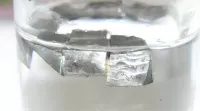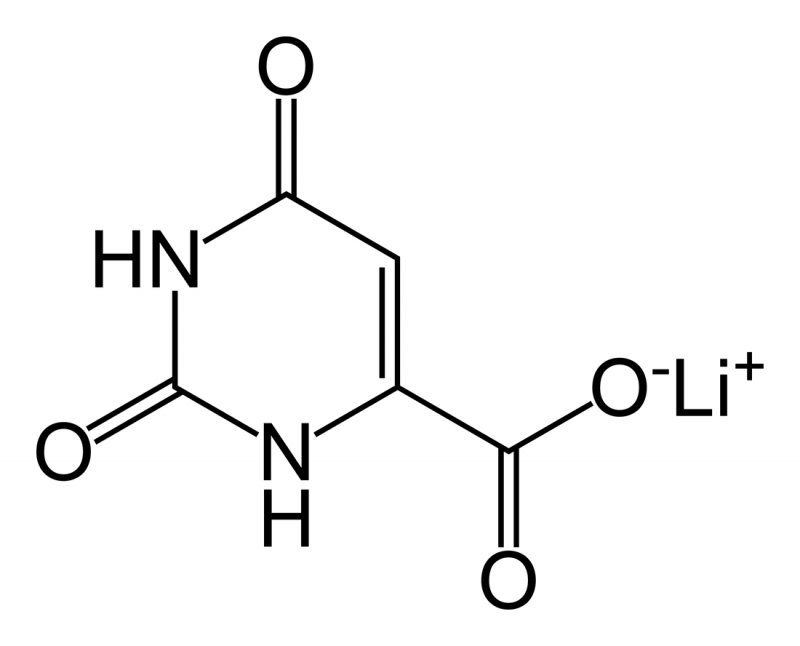Lithium orotate is a salt combining lithium and orotic acid, available as a monohydrate. Unlike other lithium salts, lithium is non-covalently bound to an orotate ion. Marketed as a dietary supplement, its potential therapeutic uses, including treatment for alcoholism and Alzheimer's disease, were explored in research conducted between 1973 and 1986. It dissolves in solution to produce free lithium ions.
1973: Initial research period of lithium orotate
From 1973, lithium orotate was researched minimally to treat certain medical conditions, such as alcoholism and Alzheimer's disease.
1973: Hans Nieper's report on lithium content
In 1973, Hans Nieper reported that lithium orotate contained 3.83 mg of elemental lithium per 100 mg, while lithium carbonate contained 18.8 mg of elemental lithium per 100 mg.
1976: Study on lithium concentrations in rat brains
In 1976, a study documented that lithium concentrations within the brains of rats were not statistically different between equivalent dosages of lithium from lithium orotate, lithium carbonate, or lithium chloride.
1978: Purported ability of lithium orotate to achieve higher concentrations
In 1978, a claim was first made regarding the purported ability of lithium orotate to achieve higher serum and brain lithium-ion (Li+) concentrations than those observed from equivalent doses of lithium carbonate.
1978: Study shows greater brain lithium concentrations with lithium orotate
In 1978, a study showed that eight hours after intraperitoneal injections, brain lithium concentrations of rats were significantly greater after lithium orotate than after lithium carbonate. Also, 24 hours after injection of lithium carbonate, little serum lithium remained, while two-thirds of the 2-hour serum lithium concentration was present 24 hours after lithium orotate. The 24-hour brain concentration of lithium after lithium orotate was approximately three times greater than that after lithium carbonate.
1979: Concerns raised regarding renal toxicity
In 1979, concerns were raised regarding the potential amplified renal toxicity of lithium orotate in comparison to lithium carbonate, likely based on the results of the use of excessively high concentrations of lithium orotate in the studies. These concerns led to the halt of clinical application and research of lithium orotate for decades since the 1980s.
1986: End of initial research period
Until 1986, lithium orotate was researched minimally to treat certain medical conditions, such as alcoholism and Alzheimer's disease.
2022: Pacholko's experiment on kidney profile and TSH levels
In 2022, Pacholko redid the experiment and showed lithium orotate to have a safer kidney profile than lithium carbonate. It also showed that both had an increased TSH only in females, but the increase was lower in the orotate group.
Mentioned in this timeline

Lithium Li atomic number is a soft silvery-white alkali metal...

Alzheimer's disease AD is a neurodegenerative disease responsible for -...
Ions are atoms or molecules that carry an electrical charge...
Trending

3 months ago Travis Hunter's College GPA Sparks Buzz After NFL Debut; Coach Praises Skillset.

52 minutes ago Musetti vs. De Minaur: ATP Finals Prediction, Head-to-Head, and Tournament Preview

2 hours ago Alcaraz Defeats De Minaur in Straight Sets at ATP Finals Opener

2 hours ago Pat Tillman: Athlete, Hero, Veteran, Remembered on Veterans Day

2 hours ago USC Men's Basketball Dominates Manhattan, Scores Most Points Since 1998 Season.

8 months ago Bill Pulte to scrutinize Fannie Mae and Freddie Mac, plans mortgage giants release.
Popular

Nancy Pelosi is a prominent American politician notably serving as...

Chuck Schumer is the senior United States Senator from New...

Zohran Kwame Mamdani is an American politician currently serving as...
Nicholas J Fuentes is a far-right political commentator and activist...

William Franklin Graham III commonly known as Franklin Graham is...

Bernie Sanders is a prominent American politician currently serving as...
